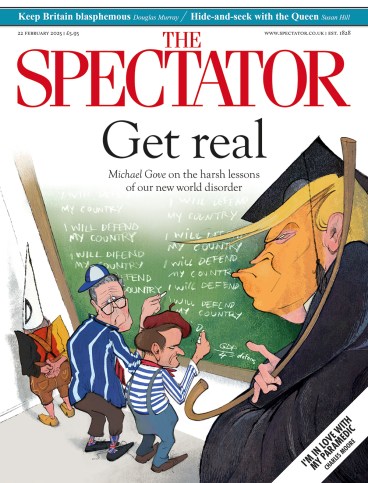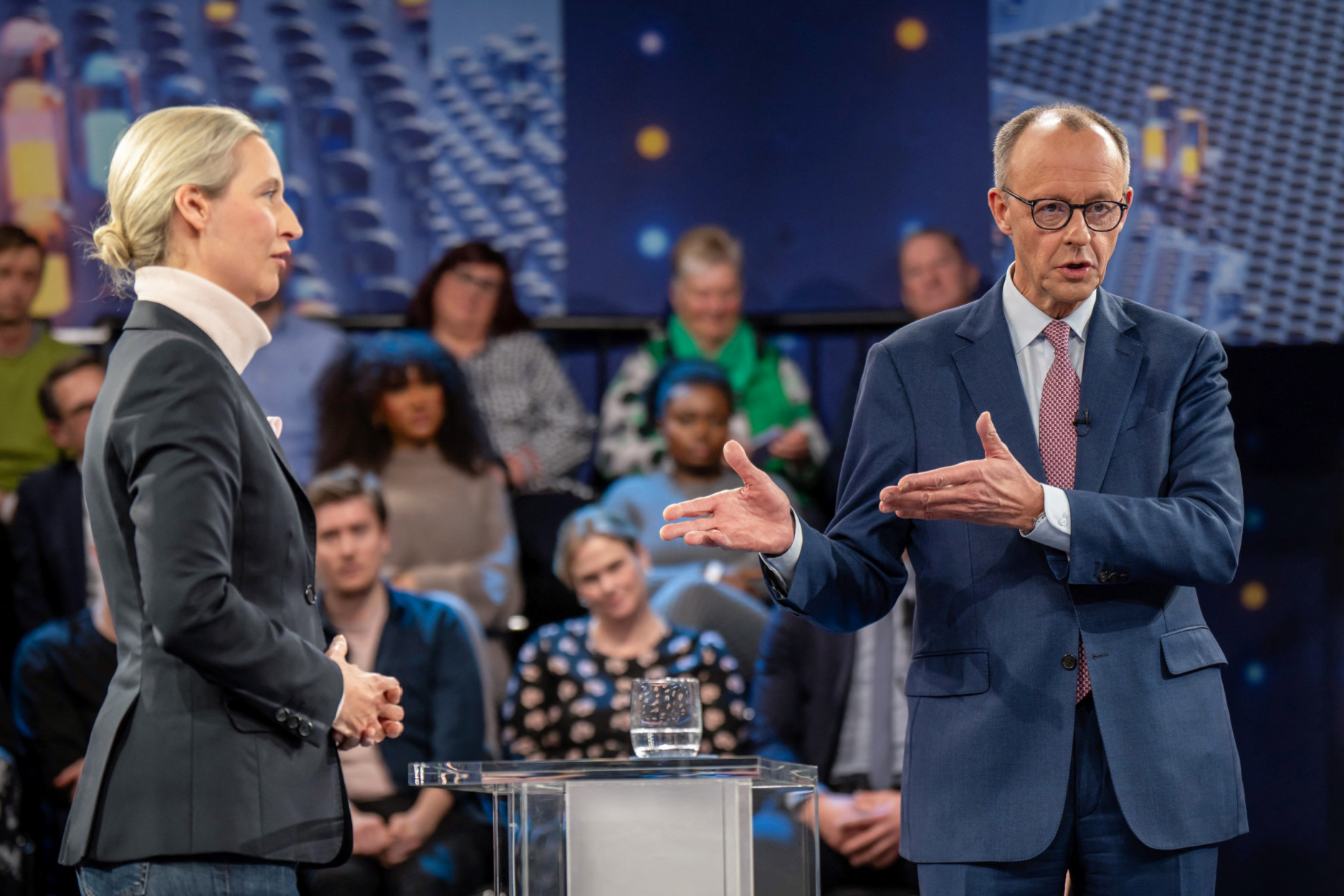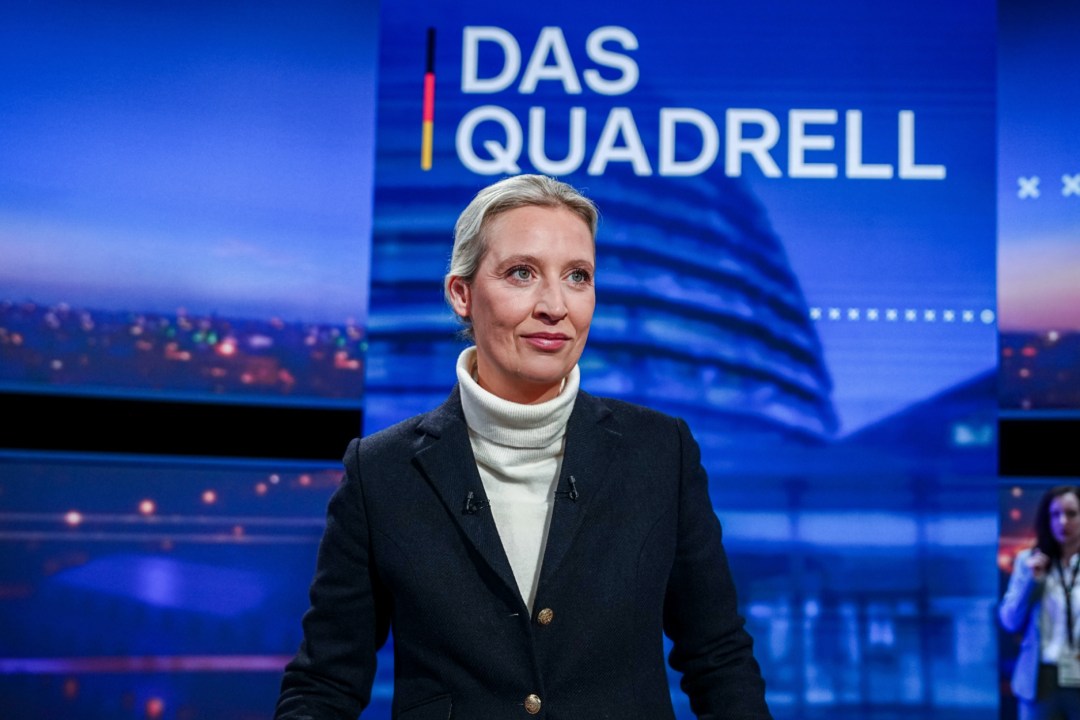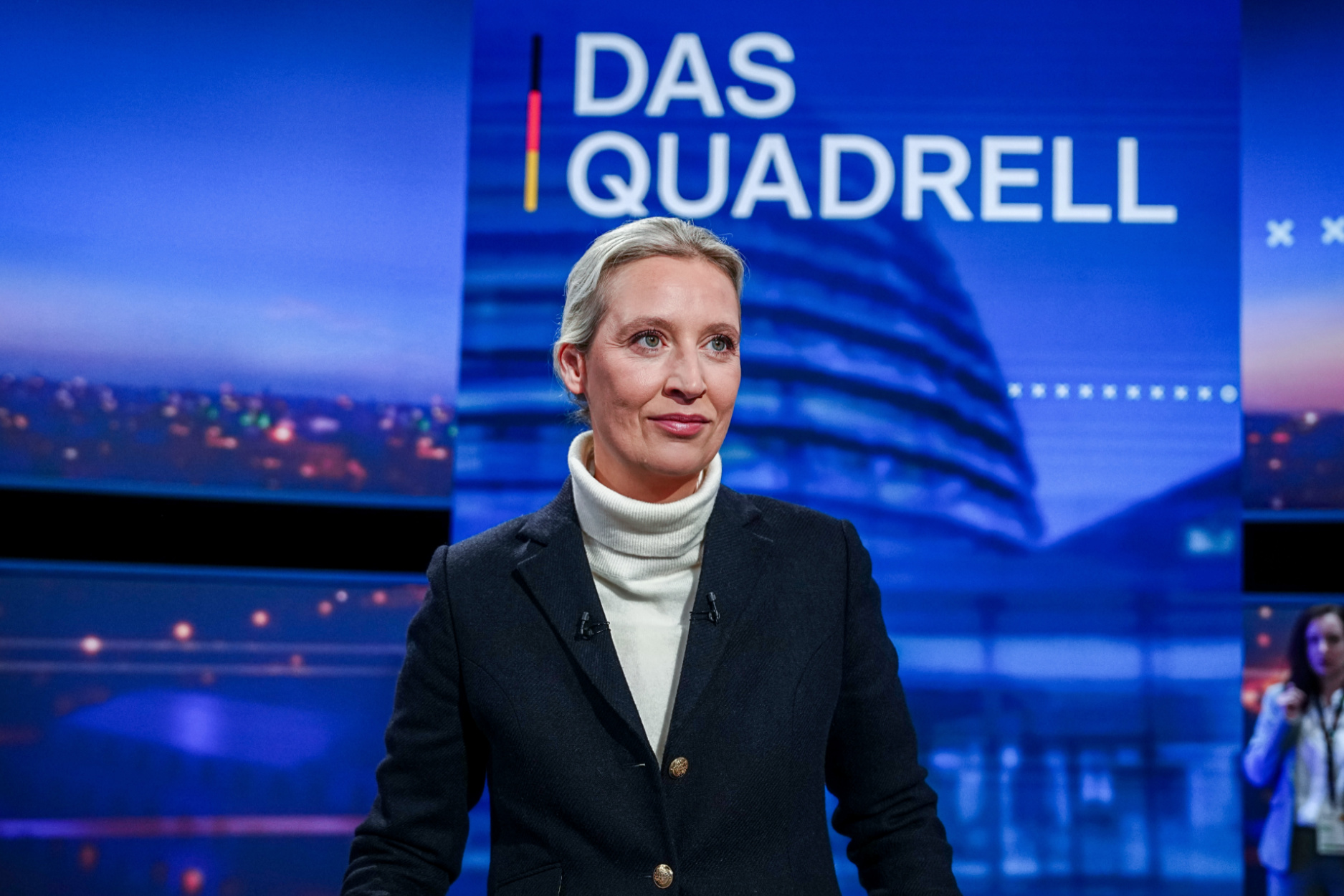
Lisa Haseldine has narrated this article for you to listen to.
In the Thuringian city of Weimar, opposite the theatre where the National Assembly hashed out Germany’s constitution in 1918, stands the museum of the history of the Weimar Republic. ‘A spectre is rising in Europe – the spectre of populism,’ a plaque reads. ‘Forces long thought overcome seem to be returning to threaten the basis of democracy. The Weimar Republic and its neighbours knew the phenomenon only too well.’
It’s a warning that will be weighing on the mind of Friedrich Merz, the leader of the conservative Christian Democratic Union (CDU) party and the man who will probably become Germany’s next chancellor. The federal election this Sunday is the culmination of a messy and fraught campaign. Olaf Scholz, the left-wing Social Democratic party (SPD) chancellor, called the vote shortly before Christmas, seven months early. His hand was forced after his three-way governing coalition finally collapsed after nearly three years of infighting. The campaign has been punctuated by three mass attacks in two months – two of them designated as terror incidents – that have left ten dead and more than 340 injured in the cities of Magdeburg, Aschaffenburg and Munich. Since the alleged perpetrator of each attack was foreign-born (two are failed asylum seekers who successfully avoided deportation), the issue of migration has dominated.
But migration isn’t Germany’s only problem. There has been no economic growth since 2022; the number of unemployed Germans rose to 1.5 million last year; the cost of living is rising. Crime is at a 15-year high.
Germans are frustrated, anxious and increasingly poor. It is no surprise, then, as the country heads to the polls, that there is a deep distrust for establishment politicians. If Merz doesn’t get it right – if he fails to lift the country out of its malaise and put it back on the path to prosperity – his government could collapse. With the increasingly popular Alternative für Deutschland (AfD) party creeping closer to the centre of German politics, could the country be facing a repeat of the Weimar Republic of the 1920s and 1930s, setting the stage for the far-right’s return to Berlin’s Chancellery?
As the country heads to the polls, there is a deep distrust for establishment politicians
If the polls are correct and the CDU is the largest party, with around 30 per cent of the vote, Merz’s first challenge will be to cobble together a coalition government. After Sunday, his best option will probably be to partner with one of the two parties vying for third place: Scholz’s SPD (to form a so-called ‘GroKo’, or grand coalition) or the Greens (the ‘Kiwi coalition’).
There are also three parties dancing around the 5 per cent threshold needed to make it to the Bundestag. If they pass the threshold, the Free Democratic party (FDP), populist left Bündnis Sahra Wagenknecht (BSW) and hard-left Linke parties could each win just over 30 seats. For parties polling at such low numbers, they nevertheless could become the kingmakers for any coalition Merz tries to assemble.
If just one of these three parties manages to make it into the Bundestag, the proportional size of the other parties will shrink. This could force Merz to bring them into his coalition to make up the numbers needed for his majority. He could end up with a ‘blackberry coalition’ (the CDU, SPD and BSW colours are black, red and purple) or a ‘Kenya coalition’ (CDU, SPD and the Greens’ combined colours resemble the Kenyan flag).
As for the AfD, the party is expected to come second in their highest ever federal result, and some polls have predicted they will win every single state in former East Germany. But to enter a coalition with the AfD would be political suicide for Merz. Last week, he once again swore that he wouldn’t consider it. In a televised election debate, he turned to AfD co-leader Alice Weidel and said: ‘Not with you.’ Nevertheless, Merz’s establishment opponents argue that he has already crossed the Rubicon by legitimising the AfD’s influence and power in parliament, when at the start of the month – to the horror of the other establishment parties – Merz relied on AfD support to pass a non-binding vote on illegal migration.

The rise of the far-right AfD has been viewed with increasing alarm from Berlin. Since Christmas the party has received high-profile endorsements from Elon Musk and J.D. Vance. At the Munich Security Conference last week, Vance denounced Germany’s politicians for isolating the AfD. ‘Democracy rests on the sacred principle that the voice of the people matters,’ he said. ‘There is no room for firewalls. You either uphold the principle or you don’t.’
Germany’s establishment parties, however, believe that engaging with the AfD in any meaningful way would threaten the country’s democracy and amount to a betrayal of the decades Germany has spent trying to atone for its Nazi history. Before the vote on illegal migration, Scholz said: ‘The firewall between democratic and undemocratic parties must not be allowed to falter.’
The AfD’s many critics often draw parallels between the party and the Nazis. These may be attack lines, but they are not all without justification. Some of the AfD’s highest-profile politicians have enjoyed flirting with Nazi imagery, phrases and ideology.
In the summer, for example, the AfD’s regional branch in Thuringia (one of three branches classified by the security services as a right-wing extremist group) brought out its state election manifesto with the lyrics of a song printed in the front. It began:
Do you still rustle, you old forests,
high up from the Rennsteig?
Do you still rock your high, celebratory sound
through golden fields?
Saale, oh you source of legends,
do you still reflect bright
mountains and castles and vineyards?
They were the words of the poet Franz Langheinrich, an early and fervent supporter of the Führer who wrote articles attacking ‘Semitic subhumans’. Since the second world war, the use and distribution of Nazi symbols has been illegal in Germany. The AfD’s Thuringia branch leader, Björn Höcke, has been fined several times by the courts for using the phrase ‘Alles für Deutschland’ – a recognised Nazi slogan used by the SA. For the federal election campaign, the AfD has been printing placards that read ‘Alice für Deutschland’ – a play on Weidel’s name.
Most of the AfD’s supporters are not neo-Nazis, of course. The disillusionment, anger and frustration with conventional politics mean that the party’s promises for deportations ‘on a massive scale’ is starting to appeal to ordinary voters who worry about Germany’s future more than its past.
Merz’s establishment party rivals also face a dilemma. Some SPD and Green politicians have been under pressure to refuse to enter coalition talks with Merz after his stunt vote in the Bundestag. But if they reject partnership with the CDU, will they end up forcing Merz towards further collaboration with the AfD just to keep his grip on power?
The problem for Merz is that he needs the Greens and SPD more than they need him. Both parties believe that Merz’s pledge to close Germany’s borders and crack down on illegal migration is unconstitutional in both German and EU law. What concessions will he have to make to get either of them to join a coalition?
The CDU has other fundamental differences of opinion with the SPD and Greens. Both of the latter want to reform Germany’s debt brake – the constitutional limit that dictates how much the government can borrow – to fund further aid for Ukraine and increase defence spending. Merz instead insists money for this can be found without taking on more debt.
Any changes to Germany’s constitutional law, whether on the debt brake or Merz’s migration proposals, must be approved by two-thirds of the Bundestag. If the polls are correct, the AfD isn’t far off being able to team up with a smaller party to form a so-called ‘blocking minority’ of 33 per cent. This way, they would be able to stop any proposed legislation they didn’t agree with and cause countless headaches for Merz.
Scholz’s failure to hold a government together is a stark warning to his successor. And yet the stakes for Merz are much higher. Many German politicians view this parliament as the last chance to keep the AfD from winning power in 2029. Another coalition collapse will only erode public trust in politics even further.
So is Germany heading towards a second Weimar? Merz’s coalition negotiations will last weeks, if not months – the Bundestag vote to confirm him as chancellor isn’t likely to happen before Easter. He will be taking over a country increasingly seduced by the message of far-right populism. The parallels with the Germany of nearly 100 years ago are compelling. Does tomorrow belong to the AfD?









Comments